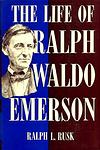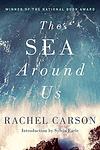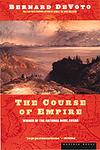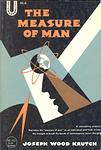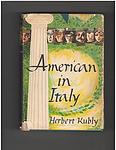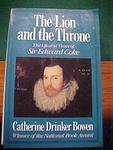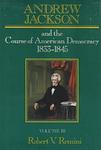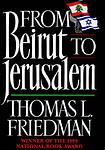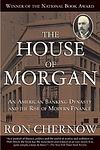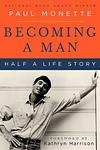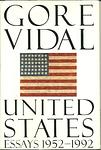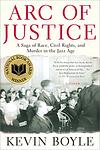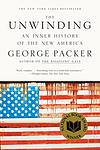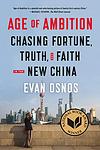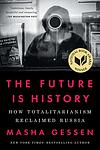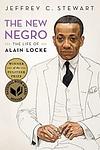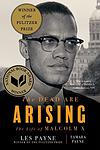National Book Award - Nonfiction
This is one of the 280 lists we use to generate our main The Greatest Books list.
-
Ralph Waldo Emerson by Ralph L. Rusk
This book is a comprehensive biography of Ralph Waldo Emerson, one of the most influential figures in American literature and philosophy. It delves into his life and works, exploring his role as a key figure in the Transcendentalist movement. The book provides an in-depth look at Emerson's personal life, his relationships, and his intellectual development, offering valuable insights into his profound influence on American thought and culture.
-
Herman Melville by Newton Arvin
This book is a comprehensive biography of a renowned American author, exploring his life, works, and the era in which he lived. It delves into the author's early life, his experiences as a sailor, and how these influenced his writing. The book also provides an in-depth analysis of his major works, including his most famous novel about a giant white whale. The author's personal struggles, including his financial difficulties and his declining popularity during his lifetime, are also detailed. The biography offers a detailed and insightful look into the life and works of one of America's greatest novelists.
-
The Sea Around Us by Rachel Carson
This book is a compelling exploration of the world's oceans, delving into their geological and biological processes. The author examines the history of the seas, from their formation millions of years ago to their present state. She discusses the sea's impact on climate and weather, its fascinating ecosystems, and the human exploration and exploitation of the oceans. The book is both a scientific study and a poetic tribute to the power and mystery of the sea.
-
The Course of Empire by Bernard A. DeVoto
"The Course of Empire" is a comprehensive historical narrative that explores the westward expansion of the United States from 1800 to 1848. The book delves into the politics, economics, and social dynamics that led to the exploration, settlement, and ultimately the transformation of the American West. It highlights the roles of key figures, the impact of the fur trade, the Gold Rush, and the Oregon Trail, and the indigenous cultures that were displaced during this period.
-
A Stillness at Appomattox by Bruce Catton
"A Stillness at Appomattox" is a historical narrative that chronicles the final year of the American Civil War, focusing on the campaigns of Ulysses S. Grant in Virginia during 1864-65, culminating in the surrender of Robert E. Lee at Appomattox Court House. The book provides an in-depth exploration of the war's end, bringing to life the personalities, strategies, and profound consequences of these pivotal events. It is renowned for its exhaustive research, vivid detail, and eloquent portrayal of the conflict's human element.
-
The Measure of Man by Joseph Wood Krutch
"The Measure of Man" is a philosophical exploration of human nature and the human condition. It delves into the profound questions about man's place in the universe, the nature of his consciousness, and his intellectual, moral, and spiritual capabilities. The book challenges readers to reflect upon the meaning of human existence, the importance of individuality, and the potential for humanity to transcend its biological limitations.
-
An American in Italy by Herbert Kubly
"An American in Italy" is a vivid and insightful exploration of post-World War II Italy as seen through the eyes of an American writer. The author shares his personal experiences and observations, offering readers a unique perspective on the country's culture, history, politics, and people. His journey takes him from the bustling streets of Rome to the tranquil countryside, revealing a rich and diverse tapestry of Italian life. This travelogue serves as both a historical document and a deeply personal narrative, capturing the essence of Italy during a pivotal time in its history.
-
Russia Leaves the War by George F. Kennan
"Russia Leaves the War" is a comprehensive historical analysis of the political, social, and economic factors that led to Russia's withdrawal from World War I. The book provides a detailed account of the internal struggles, international pressures, and key figures that influenced this critical decision. It also explores the impact of the Russian Revolution and the rise of the Bolsheviks on the nation's foreign policy, offering a nuanced understanding of this pivotal period in world history.
-
The Lion and the Throne by Catherine Drinker Bowen
"The Lion and the Throne" is a comprehensive biography of Sir Edward Coke, a prominent lawyer, judge, and politician in Elizabethan and Jacobean England. The book follows Coke's life, career, and his role in the development of the common law system. It also highlights his battles with the monarchy, especially with King James I, over the supremacy of the law and the rights of individuals, laying the groundwork for modern constitutional law.
-
Mistress to an Age: A Life of Madame De Stael by J. Christopher Herold
"Mistress to an Age: A Life of Madame De Stael" is a comprehensive biography of Germaine de Stael, one of the most influential women of the 18th and 19th centuries. The book delves into her role as a prominent writer, intellectual, and political activist during the French Revolution and Napoleonic era. It also explores her personal life, detailing her tumultuous relationships, her exile from Paris, and her influential salon that attracted many of the era's leading intellectuals and artists.
-
James Joyce by Richard Ellmann
This book is a comprehensive biography of a renowned Irish writer, delving into his life, work, and the intricate relationship between the two. It provides a detailed account of the writer's personal life, including his upbringing in Dublin, his self-imposed exile from Ireland, and his personal relationships. The book also offers a thorough analysis of his major works and the profound influence they have had on 20th-century literature. The biography is meticulously researched, drawing on a wealth of primary sources, and is written in an engaging and accessible style.
-
The Rise and Fall of the Third Reich by William L. Shirer
This book provides a comprehensive history of Adolf Hitler's Third Reich, from its inception to its downfall during World War II. The author, an American journalist who reported from Germany and Austria during the Nazi era, uses firsthand accounts, interviews, and Nazi documents to detail Hitler's rise to power, the mechanisms of the Nazi state, and the events leading to and during World War II, including the Holocaust. The book concludes with an analysis of why the Third Reich fell and the aftermath of its collapse.
-
The City in History by Lewis Mumford
"The City in History" explores the development of urban life over the course of history. The author provides a comprehensive evaluation of cities from ancient times to the modern era, examining their architectural, social, political, economic, and cultural aspects. The book also offers a critique of the urbanization process, highlighting its negative impact on human life and the environment, while advocating for a human-centered approach to urban planning.
-
Henry James by Leon Edel
This book is an in-depth biography of one of the most influential writers of the 19th century. The author meticulously details the life and work of the subject, from his early years in New York and his extensive travels in Europe, to his eventual settling in England and his career as a writer. The book delves into his relationships with family, friends, and fellow writers, as well as his own struggles with identity and sexuality. It also provides a comprehensive analysis of his novels, novellas, and short stories, highlighting his unique narrative style and his exploration of complex themes such as consciousness, morality, and social class.
-
Andrew Jackson and the Course of American Democracy by Robert V. Remini
"The Course of American Democracy" provides a detailed account of the political, social, and economic events that have shaped the United States from its inception to the present day. The author delves into the country's founding principles, major conflicts, and notable leaders, offering a comprehensive understanding of the evolution of American democracy. The book also examines the challenges and triumphs that have defined the nation's journey, emphasizing the resilience and adaptability of its democratic system.
-
Common Ground by J. Anthony Lukas
"Common Ground" is a non-fiction book that provides an in-depth examination of racial tensions in Boston, Massachusetts during the 1960s and 1970s, primarily focusing on the controversial issue of court-ordered busing to integrate public schools. The narrative follows three families - one African-American, one Irish-American, and one Yankee - to depict the effects of these tensions on the city's different communities. The book also explores the historical, political, and social context of these events, offering a comprehensive analysis of a critical period in American history.
-
Arctic Dreams by Barry Lopez
"Arctic Dreams" is a comprehensive exploration of the Arctic region, its landscapes, wildlife, and indigenous cultures. The author combines his personal experiences from his time spent in the Arctic with historical, scientific, and anthropological insights, providing readers with a profound understanding of this remote and often misunderstood region. The book also discusses the impact of climate change on the Arctic and its implications for the rest of the world.
-
The Making of the Atomic Bomb by Richard Rhodes
This comprehensive book provides an in-depth account of the development of the atomic bomb during World War II. It explores the scientific advancements that made the bomb possible, the political decisions that led to its creation, and the moral dilemmas faced by the scientists involved. The book also details the personalities of key figures in the Manhattan Project, the effects of the bomb on Hiroshima and Nagasaki, and the impact of nuclear weapons on the world.
-
A Bright Shining Lie by Neil Sheehan
"A Bright Shining Lie" is a detailed account of the Vietnam War through the eyes of a charismatic and controversial American military advisor. The book provides an in-depth examination of the war, delving into the complex political and military strategies, the culture of corruption and deceit, and the impact on both Vietnamese civilians and American soldiers. The narrative also explores the protagonist's personal life, including his troubled marriage and his eventual disillusionment with the war. The book is not just a biography, but a critical analysis of the American involvement in Vietnam.
-
From Beirut to Jerusalem by Thomas L. Friedman
This book is a comprehensive exploration of the Middle East and its complex history, politics, and conflicts, written by a journalist who spent a decade in the region. The author offers an insightful analysis of the Lebanese civil war, the Israeli-Palestinian conflict, and the broader regional dynamics, providing an in-depth understanding of the issues from a personal perspective. The book combines historical research, political analysis, and personal anecdotes, making it an engaging and informative read for anyone interested in Middle Eastern affairs.
-
The House of Morgan by Ron Chernow
"The House of Morgan" is a comprehensive history of the Morgan banking dynasty, tracing its origins from the 19th century to its present-day status. The book explores the family's influence on American and international finance, politics, and society, highlighting key figures and events. It provides an in-depth look at the workings of high finance and the power dynamics within the Morgan family, offering insights into the world of banking and the people who shaped it.
-
Freedom by Orlando Patterson
"Freedom" is an in-depth exploration of the concept of freedom throughout human history, beginning with ancient civilizations and leading up to modern times. The author analyzes how the idea has evolved and been interpreted by different cultures and societies, arguing that freedom is a socio-cultural construct rather than an inherent human right. The book also explores the paradoxical relationship between freedom and slavery, suggesting that the concept of freedom often emerged from societies where slavery was prevalent.
-
Becoming a Man: Half a Life Story by Paul Monette
"Becoming a Man: Half a Life Story" is a poignant autobiography that explores the author's journey of self-discovery and acceptance as a gay man in America. The narrative delves into his struggles with his identity, his experiences of homophobia, his life in the closet, and his eventual coming out. The book also documents his relationships, particularly with his long-term partner who succumbed to AIDS, and his own battle with the disease. The memoir serves as a powerful commentary on the societal attitudes towards homosexuality during the 20th century.
-
United States: Essays 1952-1992 by Gore Vidal
This book is a collection of essays written over a 40-year period, providing an insightful commentary on the political, historical, and cultural landscape of the United States. The author's sharp wit and incisive analysis are evident as he discusses a wide range of topics, from literature and the arts to politics and public life. His observations on American society, its leaders, and its institutions offer a critical perspective on the evolution of the nation during the second half of the 20th century.
-
How We Die: Reflections on Life's Final Chapter by Sherwin B. Nuland
This book is a contemplative exploration of death from a medical perspective, aiming to demystify the process of dying. It delves into the most common causes of death, including old age, cancer, heart disease, AIDS, accidents, and more, providing detailed descriptions of what happens to the body. The author, a surgeon, combines personal stories, historical analysis, and medical knowledge to provide a compassionate and realistic view of the end of life, encouraging readers to live fully and fearlessly.
-
The Haunted Land by Tina Rosenberg
"The Haunted Land" is a compelling exploration of the aftermath of communism in Eastern Europe, specifically in the Czech Republic, Poland, and Germany. The book delves into the struggles of these nations as they grapple with their pasts under oppressive regimes, and their attempts to move forward towards democracy. The narrative also examines the moral dilemmas faced by these societies as they confront issues of justice, retribution, and memory.
-
In the Heart of the Sea by Nathaniel Philbrick
This historical narrative tells the true story of the 19th-century whaleship Essex, which was rammed and sunk by a sperm whale in the South Pacific. Stranded thousands of miles from land, the crew of the Essex was pushed to their limits and forced to do the unthinkable to stay alive. The tale explores the harrowing ordeal of these men through their long journey at sea, their encounters with nature's fury, hunger, disease, and their own fear and despair.
-
The Noonday Demon by Andrew Solomon
"The Noonday Demon" is a comprehensive exploration of depression, drawing on the author's own struggle with the illness and interviews with fellow sufferers, doctors, and scientists, drug designers, and philosophers. It examines depression in personal, cultural, and scientific terms, covering aspects like the complexities of different treatments and the impact of the disease on various demographic populations. The book also delves into the thorny moral and ethical questions posed by emerging biological explanations for mental illness.
-
Master of the Senate by Robert Caro
This book is the third volume in a series that details the life and career of a prominent American politician. It focuses on his time in the U.S. Senate, detailing how he used his skills in persuasion and manipulation to gain power and influence. The book explores his major legislative achievements, his relationships with other politicians, and his impact on American politics. It also provides an in-depth look at the workings of the Senate and the political climate of the time.
-
Waiting for Snow in Havana: Confessions of a Cuban Boy by Carlos Eire
The book is a memoir of a young boy's life in Havana, Cuba, during the 1950s, just before and during the Cuban Revolution. It vividly depicts the boy's privileged, idyllic childhood filled with joy and adventure, which is abruptly disrupted by the political upheaval that leads to his exile to the United States. The narrative is a poignant exploration of loss, identity, displacement, and the enduring emotional impact of childhood experiences.
-
Arc of Justice by Kevin Boyle
"Arc of Justice" is a riveting and complex story that unfolds in the racially tense backdrop of 1920s Detroit. The narrative follows an African American physician who moves his family into a predominantly white neighborhood, resulting in a chain of violent events. The doctor stands trial for murder, and the case garners national attention. The book delves into the doctor's fight for justice and the broader societal implications of racial tension, prejudice, and civil rights in America.
-
The Year of Magical Thinking by Joan Didion
This book is a raw and honest exploration of grief and mourning, written by a woman who lost her husband of 40 years to a heart attack while their only child lay comatose in the hospital. The narrative delves into the year following her husband's death, a year marked by grief, confusion, and a desperate hope for things to return to normal. The author's poignant reflections on death, love, and loss serve as a powerful testament to the resilience of the human spirit.
-
The Worst Hard Time by Timothy Egan
The book is a historical account of the Dust Bowl in the 1930s, focusing on the lives of several families and individuals who chose to remain in the Great Plains despite the devastating dust storms and economic hardship. It provides an in-depth look at the environmental and human factors that led to this ecological disaster, the government's response, and the resilience of the people who lived through it. The narrative also explores the social and economic impacts of the Dust Bowl, and the lessons learned from this period of American history.
-
Legacy of Ashes: The History of the CIA by Tim Weiner
This book is a comprehensive history of the Central Intelligence Agency from its inception in 1947 to 2007. It provides an in-depth look at the agency's triumphs and failures, revealing a pattern of poor intelligence analysis, covert operations gone awry, and bureaucratic mismanagement. The author utilizes more than 50,000 documents, primarily from the archives of the CIA itself, and hundreds of interviews with CIA veterans, including ten Directors of Central Intelligence. It's a critical examination of the CIA, questioning its effectiveness and its role in both the Cold War and the War on Terror.
-
The Hemingses of Monticello by Annette Gordon-Reed
This book explores the complex and controversial history of Thomas Jefferson's relationship with his slave, Sally Hemings, and her family. It provides a detailed account of the Hemings family's life at Monticello, their interactions with Jefferson, and their experiences during and after his presidency. The narrative also delves into the wider context of slavery, race, and society in the late 18th and early 19th centuries, challenging traditional views and offering a fresh perspective on a well-known historical figure and his time.
-
The First Tycoon: The Epic Life of Cornelius Vanderbilt by T. J. Stiles
This biography provides a detailed account of the life of Cornelius Vanderbilt, one of the most influential and respected business magnates of the 19th century. Starting his career as a humble ferry operator, Vanderbilt eventually built a vast empire spanning the shipping and railroad industries, becoming one of the wealthiest people in American history. The book not only explores Vanderbilt's business achievements, but also delves into his personal life, revealing a complex and often controversial character.
-
Just Kids by Patti Smith
"Just Kids" is a poignant memoir that explores the journey of two friends in New York City during the late 1960s and 70s. The book delves into their dreams, struggles, and successes as they navigate their way through the city's vibrant art and music scene. It's a tale of love, friendship, and the pursuit of artistic inspiration, providing a raw and intimate look into their lives as they strive to make a name for themselves in the world of art and music.
-
The Swerve: How the World Became Modern by Stephen Greenblatt
The book explores the rediscovery of a long-lost poem by Lucretius, "On the Nature of Things," in the 15th century by an Italian humanist and book hunter. This poem's rediscovery, according to the book, led to a monumental shift in cultural and philosophical thought, paving the way for the Renaissance, the Enlightenment, and modern science. The book delves into the poem's content, which challenges religious dogma and promotes a world driven by natural laws and human innovation, and its profound influence on thinkers and artists for centuries.
-
Behind the Beautiful Forevers: Life, Death, and Hope in a Mumbai Undercity by Katherine Boo
This book is a gripping narrative that provides an in-depth look into the lives of residents in a Mumbai slum, focusing on their struggles and aspirations. The author paints a vivid picture of the harsh realities of poverty, corruption, and inequality, while also highlighting the resilience and hope of the inhabitants. The narrative is a powerful exploration of the complexities of modern India, revealing the stark contrast between the country's booming economy and the grim living conditions of its underprivileged citizens.
-
The Unwinding: An Inner History of the New America by George Packer
The book offers an in-depth look at the social, political, and economic transformations that have occurred in America over the past three decades. It presents a series of personal narratives from various individuals, including a factory worker, a Silicon Valley billionaire, and a Washington insider, among others. These stories serve to illustrate the larger trends and changes that have taken place in the country, such as deindustrialization, the rise of technology, and the influence of money in politics, and how these shifts have affected the American dream.
-
Age of Ambition: Chasing Fortune, Truth, and Faith in the New China by Evan Osnos
"Age of Ambition: Chasing Fortune, Truth, and Faith in the New China" is a vivid exploration of contemporary China. The book delves into the lives of everyday citizens, from dissidents to entrepreneurs, and their pursuit of wealth, freedom, and faith amidst the country's rapid modernization. It provides an in-depth look into the country's socio-political landscape, including its struggles with censorship and corruption, as well as the aspirations and challenges faced by its people in the face of change.
-
Between the World and Me by Ta-Nehisi Coates
The book is a profound work that explores the concept of race in America through the lens of the author's personal experiences. It is written as a letter to the author's teenage son, offering him a stark portrayal of his place in a society that is marked by racial injustice. The narrative provides a deeply personal analysis of American history and its lasting impact on the African American community, with the author sharing his experiences of fear, violence, and struggle. It is an exploration of the physical and psychological impacts of being black in the United States, and a call for a deeper understanding of the nation's racial history.
-
Stamped from the Beginning: The Definitive History of Racist Ideas in America by Ibram X. Kendi
This book offers a comprehensive history of anti-Black racist ideas in America, tracing their development from the earliest days of the country to the present. It challenges the notion that racism is merely the product of ignorance and hatred, instead arguing that it is a powerful and enduring system of thought that has been deliberately constructed and maintained over centuries. The book also explores the complex ways in which racist ideas have been used to justify and perpetuate social, economic, and political inequalities.
-
The Future Is History: How Totalitarianism Reclaimed Russia by Masha Gessen
This book provides a deeply researched examination of the resurgence of totalitarianism in Russia, focusing on the lives of four individuals born at what promised to be the dawn of democracy. The book explores how, after the fall of the Soviet Union, instead of moving towards a democratic society, Russia has seen a rise in a new form of totalitarianism under its current leadership. It delves into the psychological shift in the Russian populace, the government's use of homophobia as a method of control, and how the internet and social media have been weaponized for political purposes.
-
The New Negro: The Life of Alain Locke by Jeffrey C. Stewart
This comprehensive biography delves into the life and work of Alain Locke, the first African American Rhodes Scholar and a leading figure in the Harlem Renaissance. The book explores Locke's upbringing, his education, and his struggles with racism and homophobia. It also highlights his role in promoting and shaping black culture and arts during the Harlem Renaissance, his philosophy of the "New Negro," and his influence on a generation of African American artists and intellectuals.
-
The Yellow House by Sarah M. Broom
"The Yellow House" is a memoir that tells the story of a hundred years of the author's family and their relationship to home in a neglected area of one of America's most mythologized cities, New Orleans. The narrative follows the author's journey from growing up in the titular house in New Orleans East, a largely ignored part of the city, to her pursuit of education and a career as a journalist, and her eventual return to New Orleans after Hurricane Katrina. The book explores themes of race, poverty, and inequity in America, while also being a deeply personal exploration of family, identity, and place.
-
The Dead Are Arising by Les Payne
"The Dead Are Arising" is a comprehensive biography of Malcolm X, one of the most influential African American leaders in the 20th century. The book provides an in-depth account of Malcolm X's life, from his early years in poverty and crime, through his conversion to Islam and rise to prominence as a civil rights leader, to his assassination in 1965. It also delves into his complex relationships, his evolving political ideologies, and the profound impact he had on the civil rights movement.
National Book Foundation, 47 Books
The National Book Awards are among the most eminent literary prizes in the United States. Started in 1950, the awards are presented annually to American authors for literature published in the prior year, as well as lifetime achievement awards including the "Medal of Distinguished Contribution to American Letters" and the "Literarian Award". The purpose of the awards is "to celebrate the best of American literature, to expand its audience, and to enhance the cultural value of good writing in America.
Added about 10 years ago.
This list has a weight of 12%. To learn more about what this means please visit the Rankings page.
Here is a list of what is decreasing the importance of this list:
- List: only covers 1 year (yearly book awards, best of the year, etc)
- List: only covers 1 specific country
- Voters: are mostly from a single country/location
If you think this is incorrect please e-mail us at [email protected].
